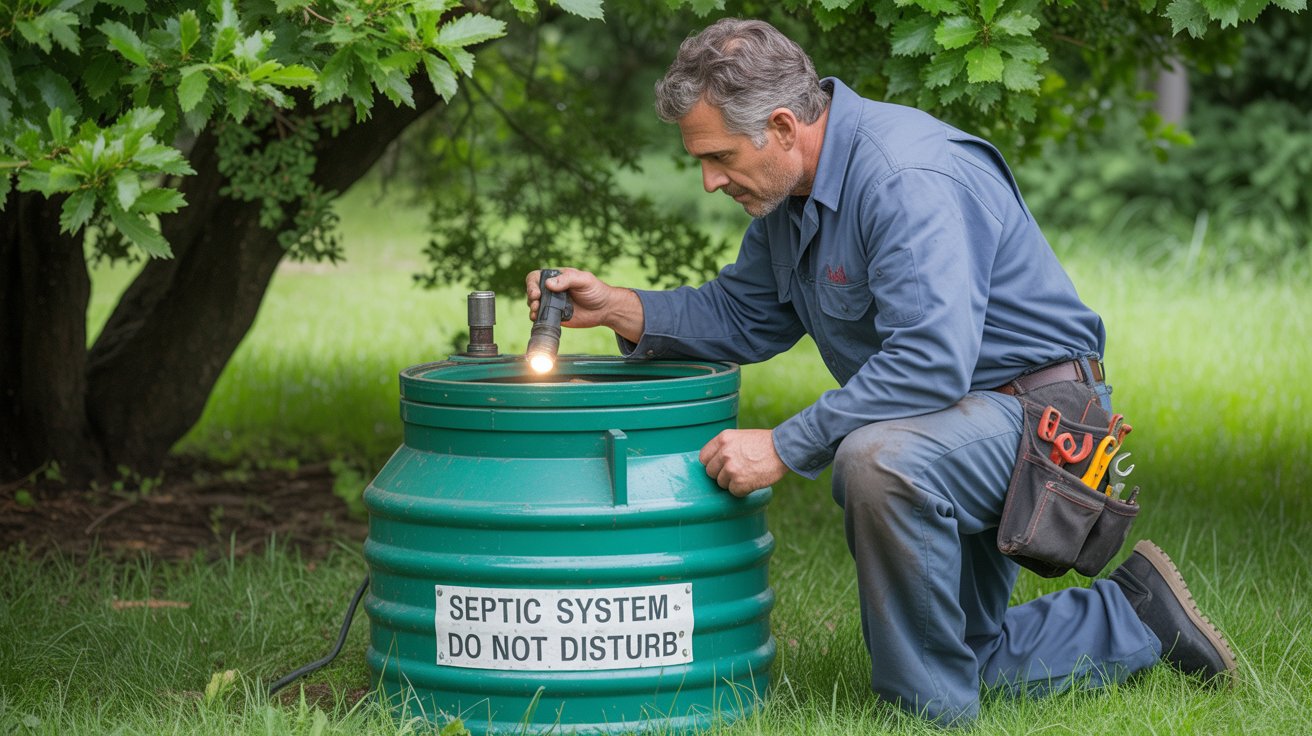Did you know that a staggering number of septic system failures occur due to improper waste disposal? Many homeowners unknowingly flush items that can cause significant damage to their septic tanks, leading to costly repairs.
Maintaining a septic system requires careful consideration of what you put down your drains. Improper flushing habits can lead to clogs, backups, and even system failure. It’s essential to understand what can and cannot be flushed to ensure the longevity of your septic system.
By being mindful of your flushing habits, you can prevent unnecessary damage and ensure your septic system operates efficiently. In this article, we’ll explore the top items to avoid flushing down your toilet.
Key Takeaways
- Understand what can and cannot be flushed down your toilet.
- Learn how to maintain your septic system for optimal performance.
- Discover the most common items that can cause damage to your septic tank.
- Prevent costly repairs by adopting proper flushing habits.
- Ensure the longevity of your septic system with proper care.
The Delicate Balance of Your Septic System
A well-functioning septic system is a result of maintaining its delicate ecological balance. This balance is crucial for the system’s longevity and overall performance.
How Septic Systems Process Waste
Septic systems process waste through a natural process involving bacteria that break down organic matter. Proper functioning relies on the balance between anaerobic and aerobic bacteria. When waste enters the septic tank, it separates into layers: scum, effluent, and sludge. The bacteria work to break down the waste, with the effluent then moving to the drain field for further filtration.
Why Proper Disposal Matters for System Longevity
Proper disposal practices are essential to maintain the health of your septic system. Flushing inappropriate items can disrupt the bacterial balance, leading to system failures. Items like chemicals, non-biodegradable materials, and excessive water can harm the system.
Short-Term vs. Long-Term Damage
Improper disposal can cause both immediate and long-term issues. In the short term, it can lead to clogs and backups. Over time, it can result in the failure of the septic system, requiring costly repairs.
Financial Costs of Septic Repairs
The financial implications of neglecting septic system care can be significant. Repairing or replacing a septic system can cost thousands of dollars. Regular maintenance and proper disposal practices are far more cost-effective.
- Regular inspections can identify potential issues early.
- Pumping the septic tank every 3-5 years is recommended.
- Being mindful of what you flush can prevent costly repairs.
By understanding and maintaining the delicate balance of your septic system, you can ensure its longevity and avoid unnecessary expenses.
1. Feminine Hygiene Products
Feminine hygiene products, such as tampons and pads, should never be flushed down the toilet if you have a septic tank. These products are designed to absorb liquid, not break down in water, and can cause significant problems for your septic system.
Why Tampons and Pads Harm Septic Tanks
Flushing tampons and pads can lead to clogs and damage to your septic system. There are two main reasons for this:
Non-Biodegradable Materials
Many tampons and pads contain non-biodegradable materials that don’t break down in your septic tank. These materials can accumulate and cause clogs in your pipes and drainfield.
Expansion Issues in Septic Systems
When tampons and pads absorb liquid in your septic tank, they can expand, causing problems with the tank’s functioning. This expansion can lead to backups and other issues.
Proper Disposal Methods
To avoid these problems, it’s essential to dispose of feminine hygiene products properly. Here are some alternatives:
Bathroom Waste Bins
One simple solution is to use a bathroom waste bin to dispose of tampons and pads. This keeps them out of your septic system and prevents clogs.
Biodegradable Alternatives
Another option is to switch to biodegradable feminine hygiene products. These products are designed to break down more easily in water, reducing the risk of clogs and damage to your septic system.
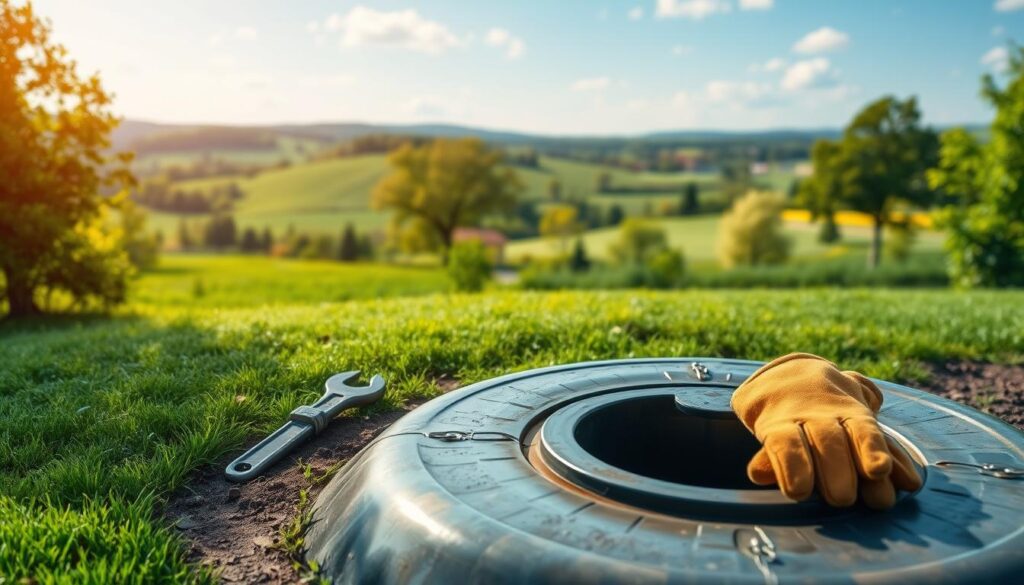
By choosing the right disposal method and being mindful of the products you use, you can help protect your septic system and ensure it continues to function properly.
2. “Flushable” Wipes: The Deceptive Marketing Myth
Despite being labeled as “flushable,” certain wipes pose a significant threat to the integrity of septic systems. The issue lies not just in their immediate flushability but in their long-term impact on septic tank functionality.
Why Wipes Don’t Break Down as Advertised
The material composition of “flushable” wipes is a primary concern. Unlike toilet paper, which is designed to disintegrate in water, these wipes are often made from polyester or polypropylene, materials that do not easily break down.
Material Composition
“Flushable” wipes are typically made from a blend of natural and synthetic materials. While they may feel like cloth, their synthetic components are not conducive to quick degradation in septic systems.
Comparison to Toilet Paper Degradation
Toilet paper is designed to dissolve quickly in water, minimizing its impact on septic systems. In contrast, “flushable” wipes do not degrade at the same rate, potentially causing clogs and backups in plumbing and septic tanks.
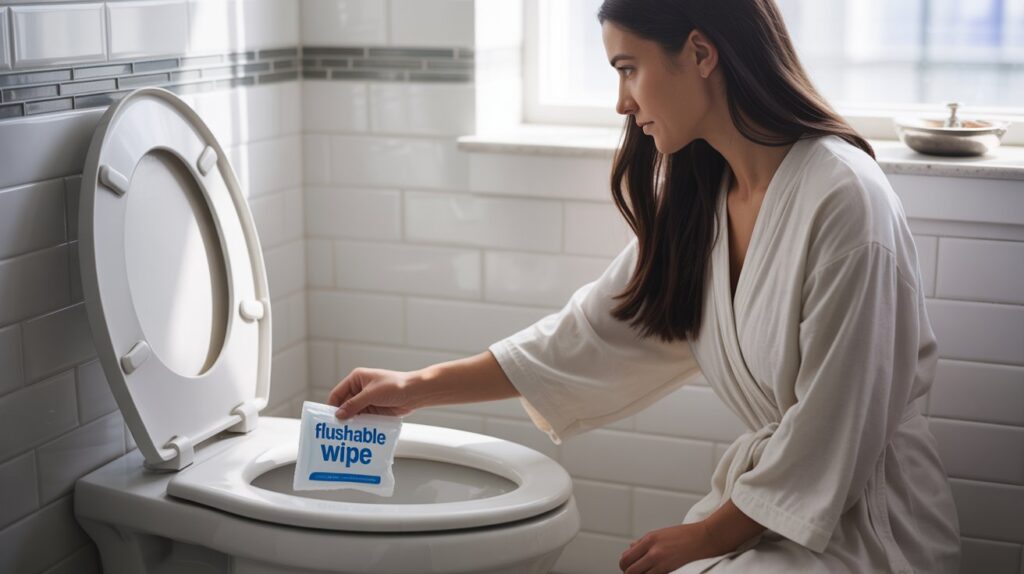
How Wipes Damage Septic Bacteria Balance
The introduction of non-degradable materials like “flushable” wipes into a septic system can disrupt the delicate balance of bacteria necessary for waste processing. This disruption can lead to system failures and costly repairs.
Septic-Safe Alternatives for Personal Hygiene
For those who rely on septic systems, there are septic-safe alternatives available for personal hygiene. These include using toilet paper for its intended purpose and opting for hygiene products specifically designed to be safe for septic systems.
3. Dental Floss, Hair, and Other Stringy Materials
Dental floss, hair, and similar stringy materials are not as harmless as they seem when it comes to maintaining a healthy septic system. These materials can cause significant problems when flushed down the toilet.
The Network Effect: How Strings Create System-Wide Clogs
When dental floss, hair, and other stringy materials are flushed, they don’t break down like toilet paper. Instead, they can entangle with other waste materials in your septic system, creating a network of strings that can clog pipes and filters.
Entanglement with Other Waste
This entanglement can lead to the formation of large clumps that are difficult for the septic system to process. As a result, these clumps can cause backups and other issues.
Pump and Filter Damage
The strings can also damage the pumps and filters within the septic system. When these critical components are compromised, the entire system can fail, leading to costly repairs.
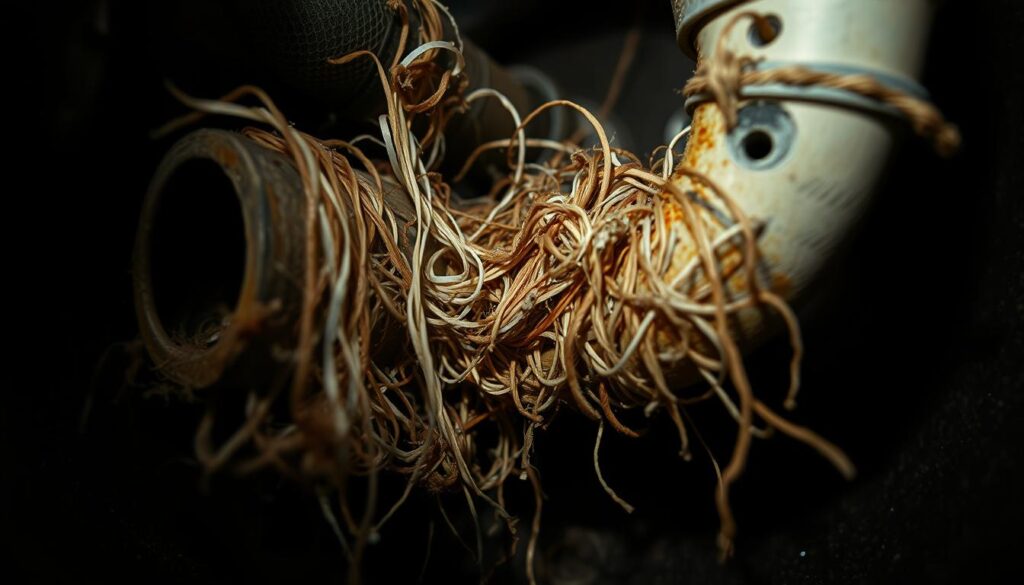
Proper Disposal Options
To avoid these issues, it’s recommended to dispose of dental floss, hair, and other stringy materials in the trash rather than flushing them down the toilet. This simple change can significantly reduce the risk of clogs and damage to your septic system.
Biodegradable Floss Alternatives
For those looking for more eco-friendly options, biodegradable floss alternatives are available. These products are designed to be more environmentally friendly and can reduce the risk of clogs in your septic system. As Dr. Emily Chen, a septic system expert, notes, “Switching to biodegradable floss is a simple step homeowners can take to protect their septic systems.”
By being mindful of what we flush down the toilet, we can help maintain the health and longevity of our septic systems. Proper disposal of dental floss, hair, and other stringy materials is a crucial step in this process.
4. Medications and Pharmaceuticals
The improper disposal of pharmaceuticals poses significant risks to septic tank maintenance and broader environmental concerns. When medications are flushed down the toilet, they can interfere with the biological processes in your septic tank and potentially contaminate the environment.
Impact on Beneficial Bacteria in Your Septic Tank
Medications, especially antibiotics, can kill the beneficial bacteria in your septic tank that are essential for breaking down waste. Without these bacteria, your septic system can fail, leading to costly repairs and potential health hazards.
Environmental Concerns Beyond Your Property
The environmental impact of flushing medications is not limited to your septic system. Pharmaceuticals can contaminate groundwater and surface water, affecting local ecosystems.
Groundwater Contamination
When medications are flushed, they can leach into the groundwater, potentially affecting drinking water sources. This contamination can have serious health implications for both humans and wildlife.
Effects on Local Ecosystems
Pharmaceuticals in waterways can disrupt the balance of local ecosystems, affecting aquatic life and potentially entering the food chain.
Safe Medication Disposal Programs
To mitigate these risks, it’s essential to use safe medication disposal methods. Many communities offer take-back programs or have designated drop-off locations for unwanted medications.
Take-Back Programs
Take-back programs allow you to return unused or expired medications to a pharmacy or other designated location, ensuring they are disposed of properly.
Home Disposal Methods
For medications that cannot be returned through take-back programs, mixing them with an undesirable substance (like coffee grounds or cat litter) before disposal in the trash can be an effective method. However, it’s crucial to remove any personal information from the packaging.
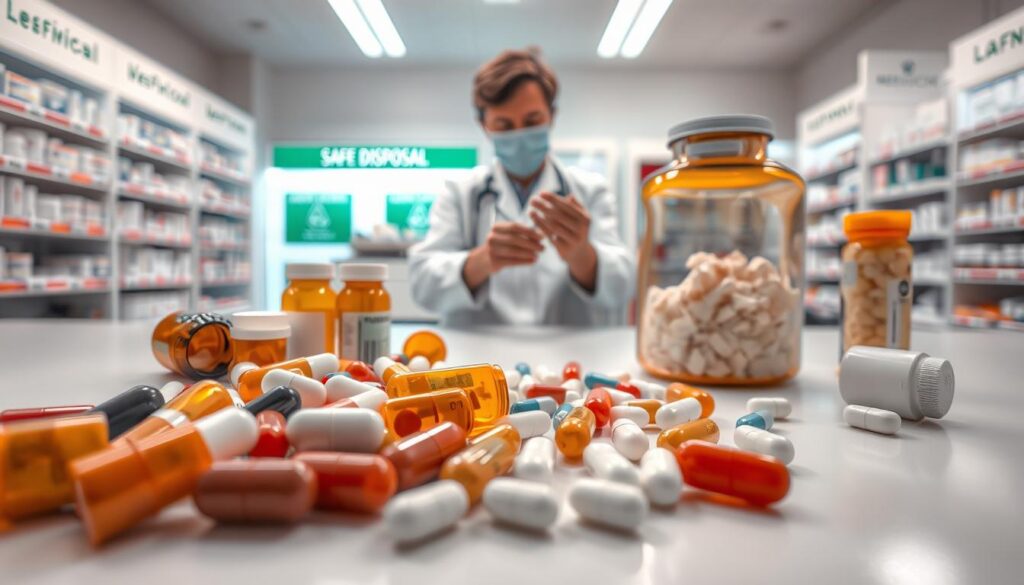
| Disposal Method | Description | Environmental Impact |
|---|---|---|
| Take-Back Programs | Return medications to pharmacies or designated locations | Low |
| Home Disposal | Mix with undesirable substances and dispose in trash | Moderate |
| Flushing | Dispose of medications by flushing down the toilet | High |
5. Household Chemicals and Cleaning Products
Household chemicals and cleaning products can significantly impact your septic system’s health. Many of these products contain harsh chemicals that can disrupt the delicate balance of bacteria in your septic tank.
How Bleach, Drain Cleaners, and Disinfectants Kill Essential Bacteria
Bleach, drain cleaners, and disinfectants are among the most harmful household chemicals for septic systems. These products contain strong chemicals that kill bacteria, including the beneficial bacteria in your septic tank that are essential for breaking down waste. The loss of these bacteria can lead to system failures and costly repairs.
Cumulative Effects of Regular Chemical Use
Regular use of household chemicals can have cumulative effects on your septic system. Over time, these chemicals can build up and cause significant disruptions to the bacterial balance, leading to potential system failures.
Septic-Safe Cleaning Alternatives
Fortunately, there are septic-safe alternatives to harsh household chemicals. Switching to these alternatives can help maintain the health of your septic system.
Natural Cleaning Solutions
- Vinegar: Effective for cleaning and deodorizing without harming bacteria.
- Baking Soda: Useful for scrubbing and neutralizing odors.
- Castile Soap: A gentle, biodegradable soap for various cleaning tasks.
Septic-Friendly Commercial Products
For those preferring commercial products, look for cleaning solutions labeled as “septic-safe” or “biodegradable.” These products are designed to be less harmful to septic systems.
Proper Disposal of Hazardous Chemicals
For household chemicals that are not septic-safe, proper disposal is crucial. Many communities have hazardous waste collection programs. Participating in these programs can help prevent environmental contamination.
By being mindful of the household chemicals you use and how you dispose of them, you can significantly contribute to the longevity and health of your septic system.
6. Cooking Oils, Grease, and Fats
Cooking oils, grease, and fats are common kitchen byproducts that can wreak havoc on your septic system if not disposed of correctly. When these substances are poured down the drain, they can cause a multitude of problems, from clogs and backups to damage to the septic tank itself.
The Journey of Grease Through Your Plumbing
When grease and cooking oils are flushed down the drain, they may seem harmless at first. However, as they travel through your plumbing system, they can solidify and cause significant blockages.
Solidification Process
As grease cools, it solidifies, sticking to the walls of your pipes. Over time, this buildup can narrow the passageway, reducing the flow of wastewater.
Pipe Narrowing and Blockages
The accumulation of grease and fats can lead to complete blockages, causing sewage backups and potentially costly repairs. Regular maintenance is crucial to prevent such issues.
Impact on Septic Tank Layers and Function
Cooking oils and grease can disrupt the delicate balance of your septic tank. They can float on top of the wastewater, creating a scum layer that interferes with the tank’s ability to process waste effectively.
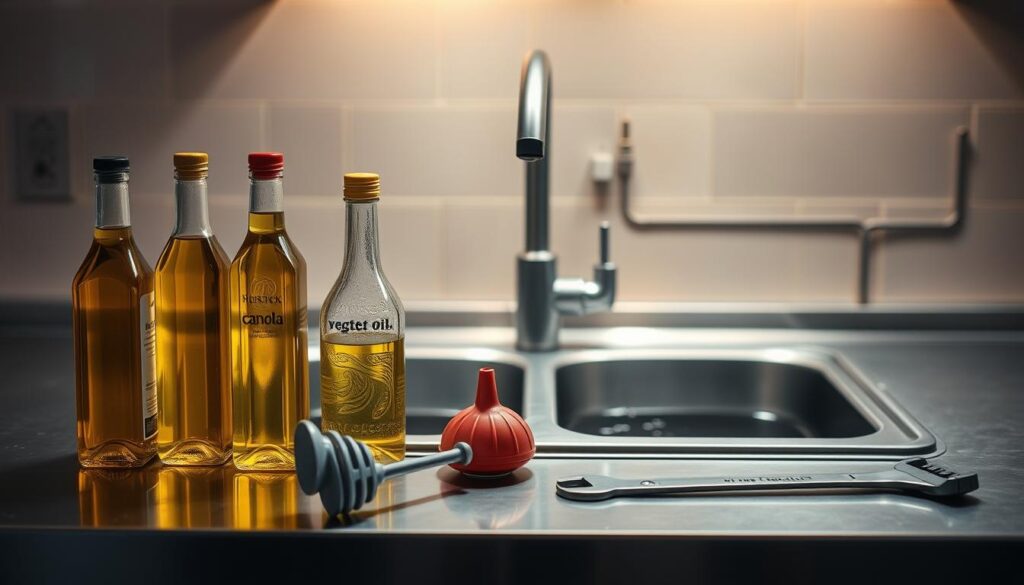
Safe Disposal Methods for Different Types of Oils
There are several ways to dispose of cooking oils and grease safely. Collecting and recycling are viable options, as many communities have programs that accept used cooking oils.
Collecting and Recycling Options
- Store used cooking oil in a designated container.
- Participate in local recycling programs that accept cooking oils.
- Check with local restaurants or waste management facilities to see if they accept used cooking oil.
Composting Considerations
Some cooking oils can be composted, but it’s essential to do so in moderation. Mixing small amounts of oil with other compost materials can help maintain a balanced compost pile.
By adopting safe disposal methods, homeowners can protect their septic systems from the harmful effects of cooking oils, grease, and fats. Regular maintenance and responsible waste disposal are key to a healthy, functioning septic system.
7. Paper Towels, Tissues, and Non-Toilet Paper Products
Flushing the wrong items, such as non-toilet paper products, down your toilet can lead to serious issues with your septic tank. While it might seem convenient to flush paper towels and tissues, these products are not designed to break down in water like toilet paper is.
Designed for Absorption, Not Dissolution
Paper towels and tissues are made to be absorbent, which means they don’t disintegrate easily when flushed. This characteristic can lead to clogs in your pipes and problems within your septic system. The structure of these products is not meant to break down in water, unlike toilet paper, which is designed to dissolve and be processed by your septic tank.
Volume Issues in Septic Tanks
The accumulation of non-biodegradable or slowly biodegradable materials like paper towels and tissues can lead to an increase in the volume of solids in your septic tank. This can result in more frequent pumping and potentially lead to system failures if not properly managed.
Sustainable Alternatives
To avoid these issues, homeowners can switch to more sustainable options. For instance, using reusable cloths instead of paper towels can significantly reduce the amount of waste that could potentially end up in your septic system.
Reusable Cloth Options
Reusable cloths are a practical alternative to paper towels and tissues. They can be washed and used multiple times, reducing the overall volume of waste. This not only helps in maintaining your septic system but also contributes to a more sustainable lifestyle.
Compostable Paper Products
For those who still prefer using paper products, opting for compostable alternatives can be a more septic-safe choice. These products are designed to break down more easily, reducing the risk of clogs and other issues in your septic system.
8. Coffee Grounds, Eggshells, and Food Waste
Coffee grounds, eggshells, and food waste are common kitchen scraps that can pose significant risks to septic systems if not disposed of correctly. While it might be tempting to dispose of these items through your garbage disposal, doing so can lead to serious maintenance issues for your septic tank.
The Myth of Garbage Disposals with Septic Systems
Many homeowners believe that garbage disposals are a convenient and harmless way to manage food waste. However, the reality is that disposals can overload septic systems with additional organic matter, potentially disrupting the delicate balance of bacteria necessary for waste processing.
Sedimentation Problems in Your Tank
Coffee grounds and eggshells can contribute to sedimentation problems in your septic tank. When these materials accumulate at the bottom of the tank, they can reduce the tank’s effective volume and lead to more frequent pumping needs. Regular maintenance is crucial to prevent such issues.
Composting Benefits for Homeowners
Composting offers a beneficial alternative for managing coffee grounds, eggshells, and other food waste. By composting, homeowners can reduce the amount of waste sent to their septic systems and create a nutrient-rich soil amendment for their gardens.
Setting Up a Simple Compost System
To start composting, you’ll need a designated compost bin or area where you can collect organic materials. Layering green materials (like food scraps) with brown materials (like dried leaves) helps maintain a healthy composting process. Regular turning of the compost pile is also essential.
What Food Waste Can and Cannot Be Composted
Not all food waste is suitable for composting. While coffee grounds, eggshells, and vegetable peels are excellent additions, avoid composting meat, dairy, and oily foods as they can attract pests and create unpleasant odors. Understanding what can and cannot be composted is key to maintaining a successful composting system.
9. Diapers, Cat Litter, and Other Absorbent Materials
Flushing diapers, cat litter, and other absorbent materials can wreak havoc on your septic system. These products are designed to absorb liquid, expanding significantly when they come into contact with moisture. This characteristic makes them particularly problematic for septic systems.
The Expansion Problem in Confined Spaces
When diapers and cat litter are flushed, they can expand and cause clogs in your pipes and septic tank. This can lead to backups and costly repairs. Moreover, these materials do not break down easily, persisting in the environment and potentially causing long-term damage.
Chemical Treatments in These Products
Many diapers and cat litters contain chemical treatments that can disrupt the balance of bacteria in your septic tank. These chemicals can kill off the beneficial bacteria necessary for breaking down waste, leading to system failures.
Proper Disposal Systems for Households
To avoid these issues, it’s essential to dispose of diapers, cat litter, and other absorbent materials properly. Here are some guidelines:
- Use designated diaper disposal bins or wrap diapers securely and dispose of them in the trash.
- For cat litter, consider using biodegradable options or scoopable litter that can be disposed of in the trash.
Diaper Disposal Options
For households with infants, diaper disposal is a significant concern. Consider using diaper pails or bags that can be sealed and thrown away in the regular trash.
Pet Waste Management
For cat owners, managing pet waste is crucial. Biodegradable cat litter and regular scooping can help minimize the environmental impact. Dispose of pet waste in the trash or consider composting if appropriate.
By adopting these disposal practices, homeowners can significantly reduce the risk of septic system damage and maintain a healthy, functioning system.
Conclusion: Protecting Your Septic Investment for Decades to Come
Maintaining a healthy septic system is crucial for preventing costly repairs and environmental damage. By understanding what not to flush down your toilet, you can significantly extend the life of your septic tank and ensure it operates efficiently.
Proper septic tank maintenance involves being mindful of the products you use and dispose of through your plumbing system. Avoid flushing items like feminine hygiene products, “flushable” wipes, and household chemicals, as they can disrupt the delicate balance of your septic system.
To protect your septic investment, adopt septic-safe practices and regularly inspect your system. This includes being cautious with what you put down your drains and taking advantage of safe disposal programs for hazardous waste. By taking these steps, you can help maintain a functioning septic system for years to come.
Regular septic system care is an investment in your home’s infrastructure and the environment. By following the guidelines outlined in this article, you can ensure your septic system remains healthy, reducing the risk of failures and the associated costly repairs.

